Jeff Gortmaker
@jeffgortmaker.com
Postdoc at Princeton Econ in 2025
Assistant Professor at NYU Stern Econ in 2026
https://jeffgortmaker.com
https://x.com/jeff_gortmaker
Assistant Professor at NYU Stern Econ in 2026
https://jeffgortmaker.com
https://x.com/jeff_gortmaker
Next week, I'm teaching another round of my online Mixtape course on BLP-style demand estimation!
The sessions are hands-on and last time we had a ton of great questions. Sign up here: www.mixtapesessions.io/session/dema...
The sessions are hands-on and last time we had a ton of great questions. Sign up here: www.mixtapesessions.io/session/dema...

October 15, 2025 at 8:15 PM
Next week, I'm teaching another round of my online Mixtape course on BLP-style demand estimation!
The sessions are hands-on and last time we had a ton of great questions. Sign up here: www.mixtapesessions.io/session/dema...
The sessions are hands-on and last time we had a ton of great questions. Sign up here: www.mixtapesessions.io/session/dema...
My job market's done, and I'm heading back to the NYC area! Excited to join Princeton Econ as a postdoc next year and NYU Stern Econ as an AP in 2026.
In a happy twist of fate, this means @cconlon.bsky.social and I will be colleagues exactly 10 years after our first PyBLP commit:
In a happy twist of fate, this means @cconlon.bsky.social and I will be colleagues exactly 10 years after our first PyBLP commit:
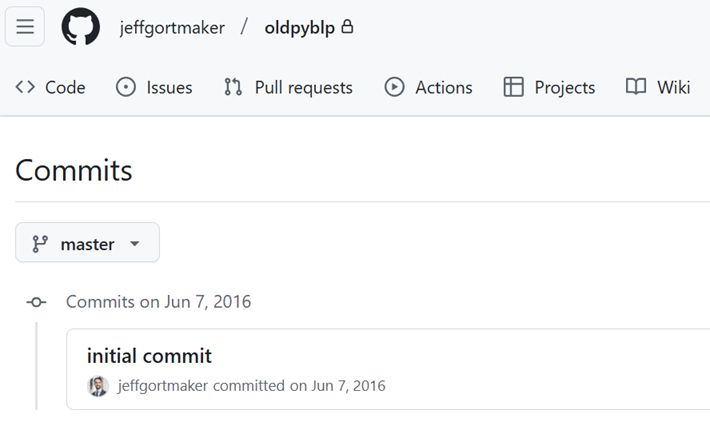
March 7, 2025 at 10:34 PM
My job market's done, and I'm heading back to the NYC area! Excited to join Princeton Econ as a postdoc next year and NYU Stern Econ as an AP in 2026.
In a happy twist of fate, this means @cconlon.bsky.social and I will be colleagues exactly 10 years after our first PyBLP commit:
In a happy twist of fate, this means @cconlon.bsky.social and I will be colleagues exactly 10 years after our first PyBLP commit:
4/6 When others rely on your code, you write more tests, which can benefit your (future) self. For every PyBLP version, I run ~2k tests across ~50 functions. These made it easy to broaden the scope of our papers by adding new simulations and empirical examples with confidence.
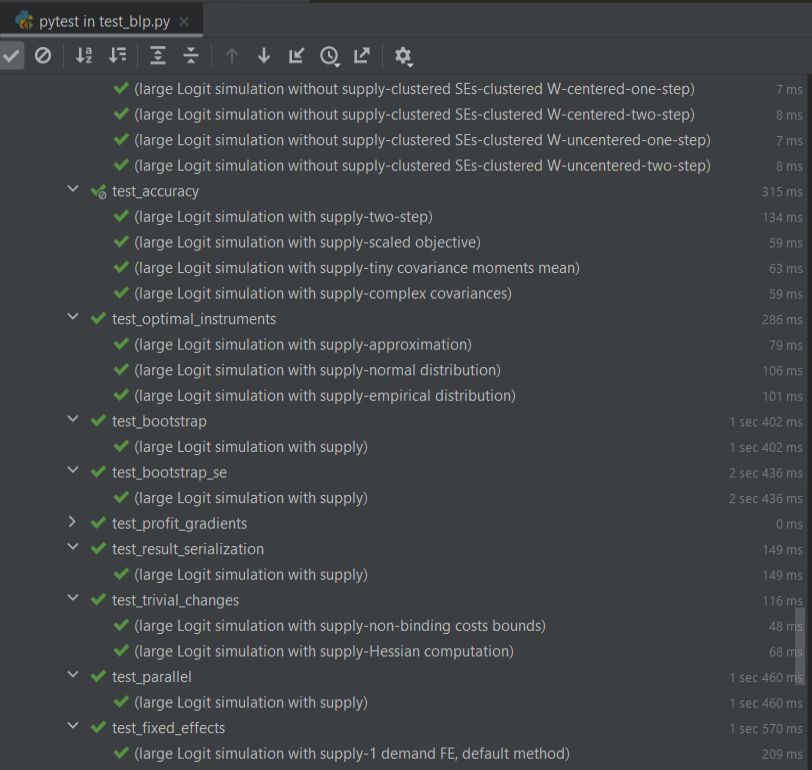
November 29, 2024 at 3:50 PM
4/6 When others rely on your code, you write more tests, which can benefit your (future) self. For every PyBLP version, I run ~2k tests across ~50 functions. These made it easy to broaden the scope of our papers by adding new simulations and empirical examples with confidence.
3/6 For micro BLP, I spent time iterating on PyBLP's interface to balance usability and flexibility. Feedback from users helped improve my design, which mapped directly into our standardized econometric framework, a key contribution of the 2nd paper.
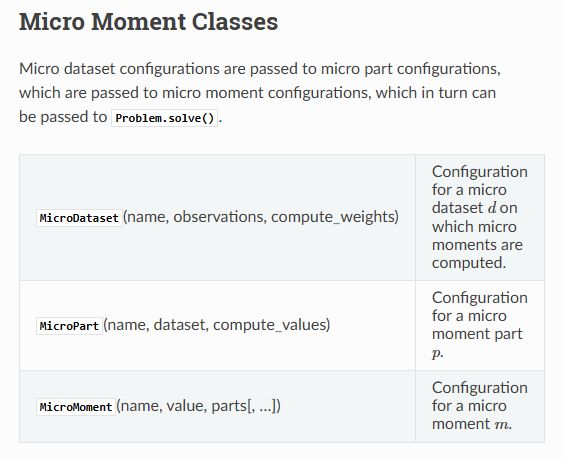
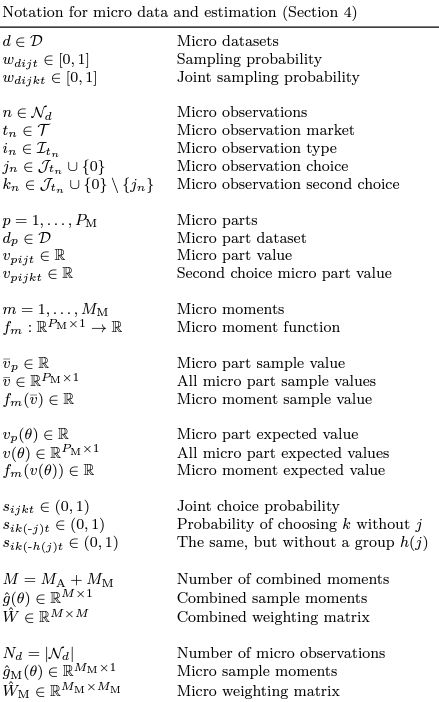
November 29, 2024 at 3:50 PM
3/6 For micro BLP, I spent time iterating on PyBLP's interface to balance usability and flexibility. Feedback from users helped improve my design, which mapped directly into our standardized econometric framework, a key contribution of the 2nd paper.
2/6 I expected PyBLP's issue tracker (github.com/jeffgortmake...) to be mostly bug reports, but most are questions. Our 2nd paper was motivated by these interactions, and many of our explanations were informed by discussions on the tracker and emails from less vocal users.
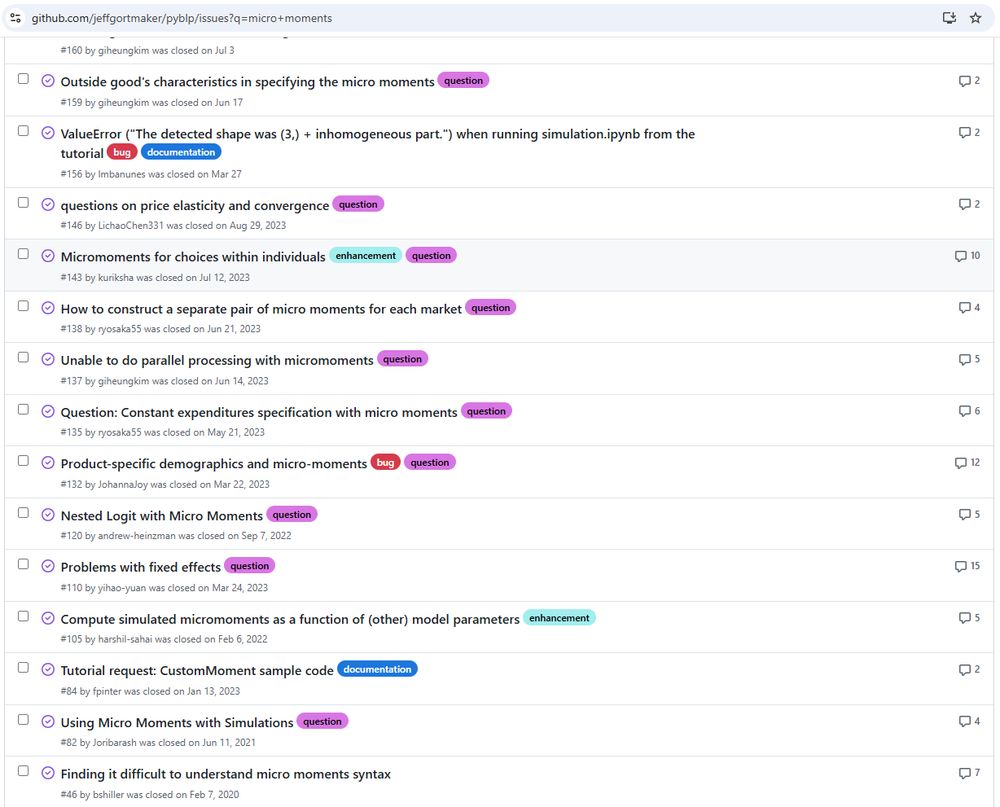
November 29, 2024 at 3:50 PM
2/6 I expected PyBLP's issue tracker (github.com/jeffgortmake...) to be mostly bug reports, but most are questions. Our 2nd paper was motivated by these interactions, and many of our explanations were informed by discussions on the tracker and emails from less vocal users.
Happy to share that my and @cconlon.bsky.social's micro BLP paper was just accepted at the Journal of Econometrics! jeffgortmaker.com/files/Incorp...
It's our 2nd tied to our PyBLP software, so here's a thread on surprising (to me) benefits of combining methods research with open source work. 1/6
It's our 2nd tied to our PyBLP software, so here's a thread on surprising (to me) benefits of combining methods research with open source work. 1/6
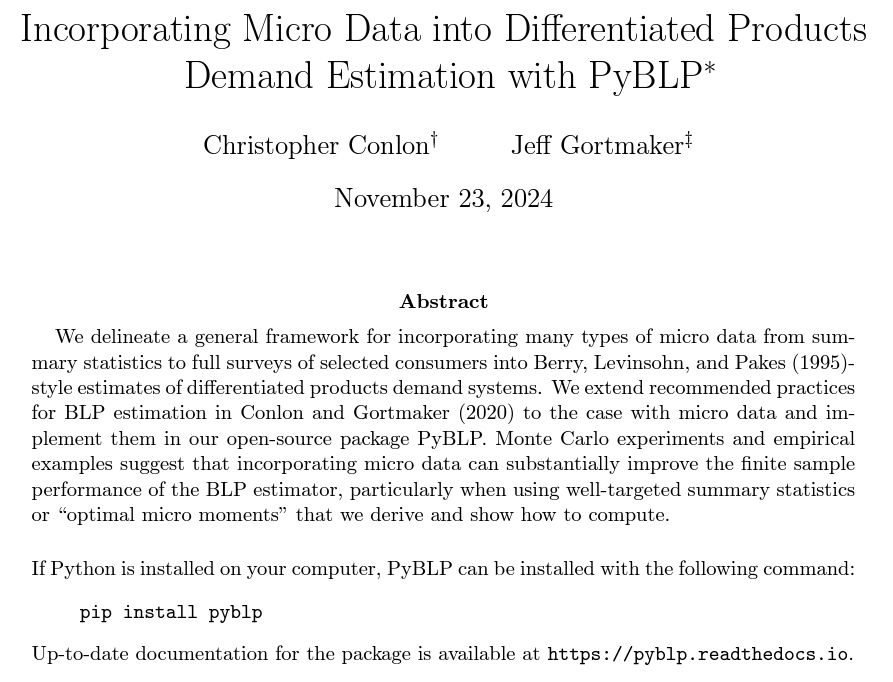
November 29, 2024 at 3:50 PM
Happy to share that my and @cconlon.bsky.social's micro BLP paper was just accepted at the Journal of Econometrics! jeffgortmaker.com/files/Incorp...
It's our 2nd tied to our PyBLP software, so here's a thread on surprising (to me) benefits of combining methods research with open source work. 1/6
It's our 2nd tied to our PyBLP software, so here's a thread on surprising (to me) benefits of combining methods research with open source work. 1/6
16/ What if China tightened its restrictions?
Benefits don't seem localized enough for a "tax" on foreign collaboration to boost domestic OSS investment. Instead, lost spillovers raise web development costs globally.
Benefits don't seem localized enough for a "tax" on foreign collaboration to boost domestic OSS investment. Instead, lost spillovers raise web development costs globally.
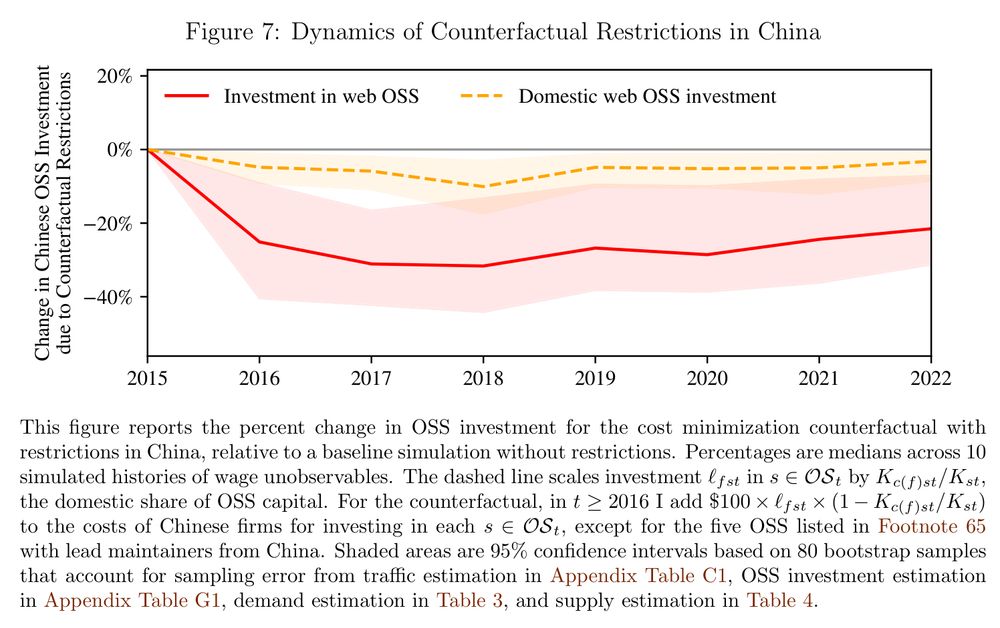
November 18, 2024 at 7:24 PM
16/ What if China tightened its restrictions?
Benefits don't seem localized enough for a "tax" on foreign collaboration to boost domestic OSS investment. Instead, lost spillovers raise web development costs globally.
Benefits don't seem localized enough for a "tax" on foreign collaboration to boost domestic OSS investment. Instead, lost spillovers raise web development costs globally.
14/ Subject to the production function, firms' cost-minimizing choices reveal web development costs.
Firms prefer OSS with more, own, and domestic investment. The model translates these patterns into public, private, and localized benefits of OSS investment.
Firms prefer OSS with more, own, and domestic investment. The model translates these patterns into public, private, and localized benefits of OSS investment.
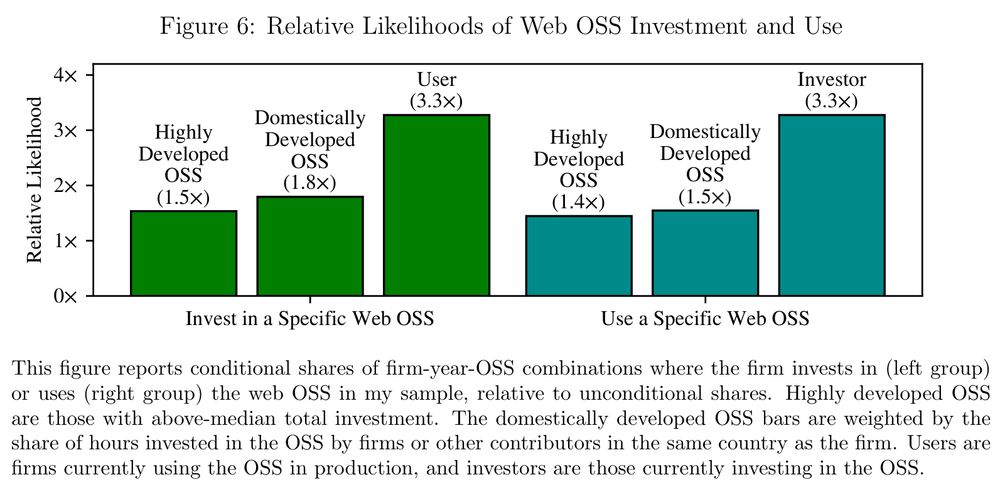
November 18, 2024 at 7:24 PM
14/ Subject to the production function, firms' cost-minimizing choices reveal web development costs.
Firms prefer OSS with more, own, and domestic investment. The model translates these patterns into public, private, and localized benefits of OSS investment.
Firms prefer OSS with more, own, and domestic investment. The model translates these patterns into public, private, and localized benefits of OSS investment.
13/ I estimate website quality's production function using timing assumptions.
A weak link between OSS use and traffic translates into a weak effect of OSS use on quality, limiting the effect of OSS on competition and consumers in policy simulations.
A weak link between OSS use and traffic translates into a weak effect of OSS use on quality, limiting the effect of OSS on competition and consumers in policy simulations.
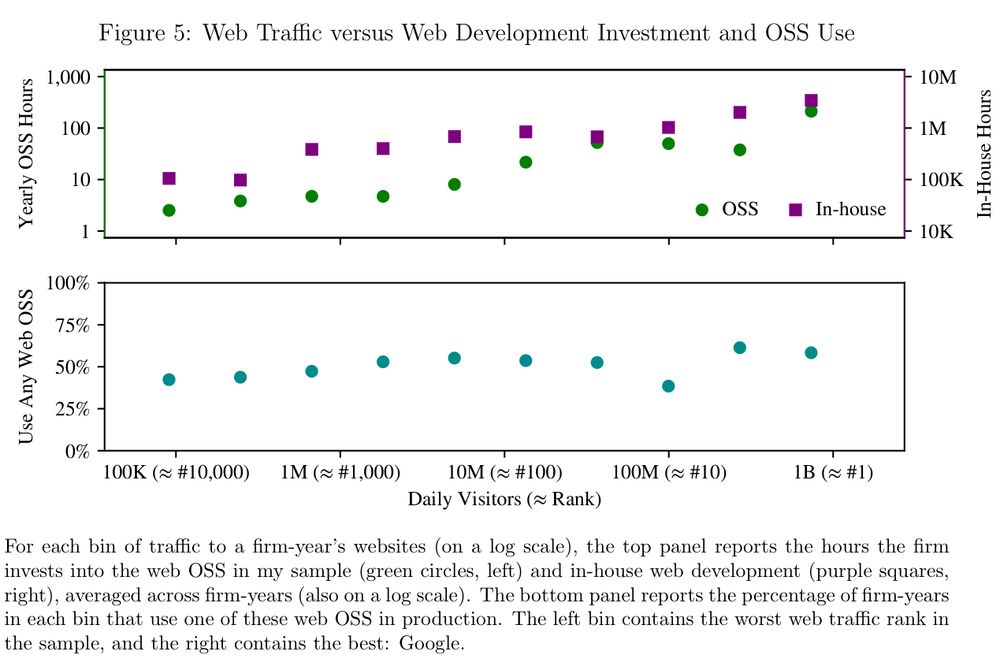
November 18, 2024 at 7:24 PM
13/ I estimate website quality's production function using timing assumptions.
A weak link between OSS use and traffic translates into a weak effect of OSS use on quality, limiting the effect of OSS on competition and consumers in policy simulations.
A weak link between OSS use and traffic translates into a weak effect of OSS use on quality, limiting the effect of OSS on competition and consumers in policy simulations.
12/ Consumers choose websites based on country, language, and quality.
I get to use my own OSS PyBLP to estimate demand! I find strong "home bias," limiting international competition in policy simulations.
I get to use my own OSS PyBLP to estimate demand! I find strong "home bias," limiting international competition in policy simulations.

November 18, 2024 at 7:24 PM
12/ Consumers choose websites based on country, language, and quality.
I get to use my own OSS PyBLP to estimate demand! I find strong "home bias," limiting international competition in policy simulations.
I get to use my own OSS PyBLP to estimate demand! I find strong "home bias," limiting international competition in policy simulations.
11/ Investment grows codebases, a form of knowledge capital. Key externality: all firms can benefit from OSS.
But benefits are uneven: firms contribute features that primarily help themselves (private benefits) and features in Chinese especially help China (localized benefits).
But benefits are uneven: firms contribute features that primarily help themselves (private benefits) and features in Chinese especially help China (localized benefits).

November 18, 2024 at 7:24 PM
11/ Investment grows codebases, a form of knowledge capital. Key externality: all firms can benefit from OSS.
But benefits are uneven: firms contribute features that primarily help themselves (private benefits) and features in Chinese especially help China (localized benefits).
But benefits are uneven: firms contribute features that primarily help themselves (private benefits) and features in Chinese especially help China (localized benefits).
10/ I build an empirical model of private incentives to provide and use web OSS.
Firms choose labor and software to maximize profits: revenue from quality production minus web developer costs.
Firms choose labor and software to maximize profits: revenue from quality production minus web developer costs.

November 18, 2024 at 7:24 PM
10/ I build an empirical model of private incentives to provide and use web OSS.
Firms choose labor and software to maximize profits: revenue from quality production minus web developer costs.
Firms choose labor and software to maximize profits: revenue from quality production minus web developer costs.
9/ Using survey data, I convert OSS activity and LinkedIn employment into hours of OSS and in-house investment.
While OSS investment is rare and concentrated, web OSS usage is widespread and dispersed.
While OSS investment is rare and concentrated, web OSS usage is widespread and dispersed.

November 18, 2024 at 7:24 PM
9/ Using survey data, I convert OSS activity and LinkedIn employment into hours of OSS and in-house investment.
While OSS investment is rare and concentrated, web OSS usage is widespread and dispersed.
While OSS investment is rare and concentrated, web OSS usage is widespread and dispersed.
8/ I construct a panel of firms operating the world's top websites.
First, I identify OSS used to build archived homepages of the top 10,000 websites (2014-2022). Then, I link web OSS → 200K GitHub contributors → employers on LinkedIn → back to these websites.
First, I identify OSS used to build archived homepages of the top 10,000 websites (2014-2022). Then, I link web OSS → 200K GitHub contributors → employers on LinkedIn → back to these websites.
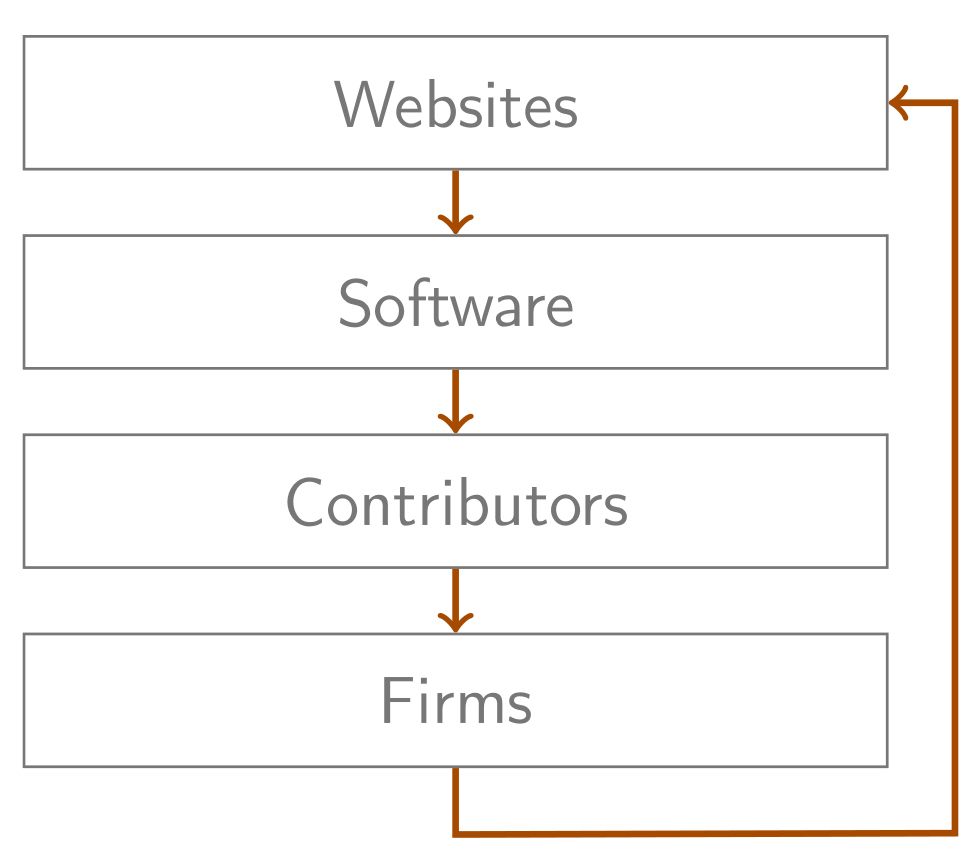
November 18, 2024 at 7:24 PM
8/ I construct a panel of firms operating the world's top websites.
First, I identify OSS used to build archived homepages of the top 10,000 websites (2014-2022). Then, I link web OSS → 200K GitHub contributors → employers on LinkedIn → back to these websites.
First, I identify OSS used to build archived homepages of the top 10,000 websites (2014-2022). Then, I link web OSS → 200K GitHub contributors → employers on LinkedIn → back to these websites.
7/ I focus on web development: a large industry employing about 13% of software developers.
Web development is ideal because it lets us observe software inputs - key for a revealed preference approach.
Web development is ideal because it lets us observe software inputs - key for a revealed preference approach.

November 18, 2024 at 7:24 PM
7/ I focus on web development: a large industry employing about 13% of software developers.
Web development is ideal because it lets us observe software inputs - key for a revealed preference approach.
Web development is ideal because it lets us observe software inputs - key for a revealed preference approach.
5/ China has also restricted its domestic platform.
In May 2022, Gitee had to freeze all OSS projects for manual review. I collect Gitee data to document a sharp drop in activity after this censorship event.
In May 2022, Gitee had to freeze all OSS projects for manual review. I collect Gitee data to document a sharp drop in activity after this censorship event.

November 18, 2024 at 7:24 PM
5/ China has also restricted its domestic platform.
In May 2022, Gitee had to freeze all OSS projects for manual review. I collect Gitee data to document a sharp drop in activity after this censorship event.
In May 2022, Gitee had to freeze all OSS projects for manual review. I collect Gitee data to document a sharp drop in activity after this censorship event.
4/ Chinese developers use VPNs to bypass internet restrictions.
I show a growing "VPN gap" between my measure of Chinese GitHub activity (based on self-reported locations) and GitHub's Innovation Graph data (based on IPs).
I show a growing "VPN gap" between my measure of Chinese GitHub activity (based on self-reported locations) and GitHub's Innovation Graph data (based on IPs).

November 18, 2024 at 7:24 PM
4/ Chinese developers use VPNs to bypass internet restrictions.
I show a growing "VPN gap" between my measure of Chinese GitHub activity (based on self-reported locations) and GitHub's Innovation Graph data (based on IPs).
I show a growing "VPN gap" between my measure of Chinese GitHub activity (based on self-reported locations) and GitHub's Innovation Graph data (based on IPs).
3/ Along with subsidies, China appears willing to restrict OSS contributions.
I use censorship watchdog data to show that in 2021, China made it harder for domestic developers to access GitHub directly.
I use censorship watchdog data to show that in 2021, China made it harder for domestic developers to access GitHub directly.

November 18, 2024 at 7:24 PM
3/ Along with subsidies, China appears willing to restrict OSS contributions.
I use censorship watchdog data to show that in 2021, China made it harder for domestic developers to access GitHub directly.
I use censorship watchdog data to show that in 2021, China made it harder for domestic developers to access GitHub directly.
2/ I build an empirical model to quantify the global effects of China expanding its OSS policies (and a US response).
Before the model, what's going on in China? Most OSS collaboration happens on GitHub. Less-known is its Chinese counterpart, Gitee, state-backed since 2020.
Before the model, what's going on in China? Most OSS collaboration happens on GitHub. Less-known is its Chinese counterpart, Gitee, state-backed since 2020.

November 18, 2024 at 7:24 PM
2/ I build an empirical model to quantify the global effects of China expanding its OSS policies (and a US response).
Before the model, what's going on in China? Most OSS collaboration happens on GitHub. Less-known is its Chinese counterpart, Gitee, state-backed since 2020.
Before the model, what's going on in China? Most OSS collaboration happens on GitHub. Less-known is its Chinese counterpart, Gitee, state-backed since 2020.
Hey #EconSky, I'm on the job market with an #EconJMP about open source software. OSS is a global public good, widely used and provided by the private sector, but the target of recent industrial policy.
Paper: jeffgortmaker.com/files/Open_S...
1/
Paper: jeffgortmaker.com/files/Open_S...
1/
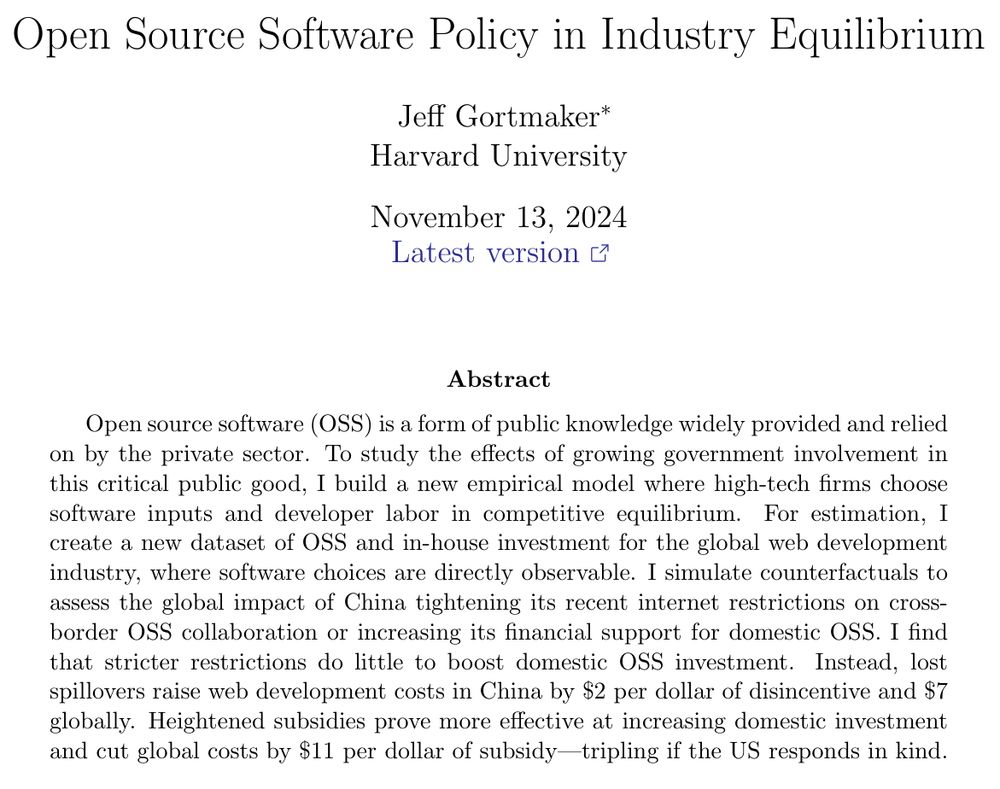
November 18, 2024 at 7:24 PM
Hey #EconSky, I'm on the job market with an #EconJMP about open source software. OSS is a global public good, widely used and provided by the private sector, but the target of recent industrial policy.
Paper: jeffgortmaker.com/files/Open_S...
1/
Paper: jeffgortmaker.com/files/Open_S...
1/

